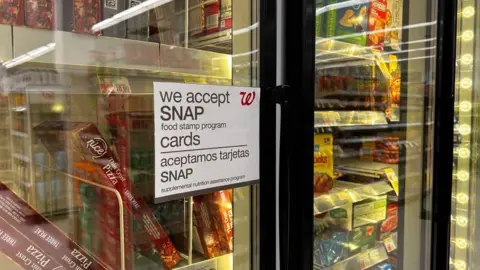Trump administration must continue food aid during shutdown, US judges say
 Universal Images Group via Getty Images
Universal Images Group via Getty ImagesThe Trump administration cannot suspend food aid used by about 42 million low-income Americans during the US government shutdown, two federal judges have ruled.
The rulings said the government must pay for the Supplemental Nutrition Assistance Program (Snap) benefits, also known as food stamps, using emergency funds.
US President Donald Trump said he had instructed government lawyers to ask the courts how the administration could legally fund Snap, adding: "Even if we get immediate guidance, it will unfortunately be delayed."
While individual US states administer the benefits, the programme uses money from the federal government, which has been unfunded and shut down since 1 October.
Republicans and Democrats have traded blame for the federal shutdown, which is entering its second month.
The Snap programme works by giving people reloadable debit cards that they can use to buy essential grocery items. A family of four on average receives $715 (£540) per month, which breaks down to a little less than $6 (£4.50) per day, per person.
Several states have pledged to use their own funds to cover any shortfall, but have been warned by the federal government that they will not be reimbursed.
The US Department of Agriculture (USDA) said it will not distribute food assistance funds in November due to the shutdown, saying: "The well has run dry".
Treasury Secretary Scott Bessent said payments could be made as soon as Wednesday.
"There's a process that has to be followed, so we have got to figure out what the process is," Bessent told CNN on Sunday.
Pressed on whether that process could be done by the middle of the week to give out benefits, he replied: "Could be".
Dozens of US states sued the Trump administration over its plans to halt funding, hoping to force it to use a roughly $6bn (£4.5bn) emergency contingency fund for Snap.
Trump said on Truth Social on Friday: "If we are given the appropriate legal direction by the Court, it will BE MY HONOR to provide the funding."
Massachusetts US District Judge Indira Talwani wrote in her decision that the states that sued were likely to win in court on their claim that "Congress intended the funding of Snap benefits, at a reduced rate if necessary, when appropriated funds prove insufficient".
The judge said the administration must access the contingency funding to pay the benefits and had until Monday to report back to the court on whether they will authorise at least partial benefits for November.
Judge Talwani also wrote that the Trump administration "erred in concluding" that the USDA was blocked by law from tapping the emergency reserves in the contingency fund when there was a lapse in federal funding.
The USDA had said those reserves were insufficient to pay full benefits, which cost $8.5bn-$9bn each month. Agriculture Secretary Brooke Rollins had said she would only use the fund for an emergency such as a natural disaster.
Even if the government turns to the contingency fund, it would only be able to cover about 60% of beneficiaries in a single month, according to the Center on Budget and Policy Priorities (CBPP), a think-tank focused on policies that help low-income families.
Judge Talwani also asked the administration to report back on whether it will pay full benefits for the month by moving money from other programmes, similar to the administration transferring military research funds earlier this month to pay members of the armed forces.
In a separate ruling in Rhode Island, federal Judge John J McConnell Jr ordered the Trump administration to make full Snap benefit payments by 3 November.
The judge said the contingency fund - in addition to a separate $23bn fund created through the Agricultural Adjustment Act amendments of 1935 - could be used to make full payments.
If the government chooses not to use these other funds, Judge McConnell Jr ruled the government had to make a partial payment using the total amount of the contingency funds by 5 November.
The USDA did not comment on the decisions. The BBC has also contacted the Office of Management and Budget for comment.
The National Parents Union urged the government to take action, calling the move to halt benefits "a moral disgrace and a direct assault on America's working families".
